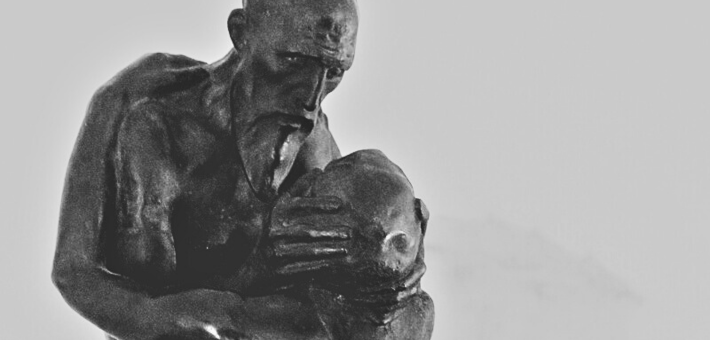Commentary on Joshua 5:9-12
The content of this passage and its literary setting highlight two important markers for an Israelite identity. Joshua 5:2–8 speaks about the circumcision of the second generation that was born in the wilderness, while verses 9–12 present the celebration of the Passover by the Israelites in the land of the promise. These two rituals recall the divine covenant with Abraham in Genesis 17, and the Passover is a reminder of the liberation of the Israelites from Pharaoh’s oppression.
Rolling away the reproach of Egypt (Joshua 5:9)
YHWH addresses Joshua, saying that the God of Israel has rolled away the “reproach of Egypt.” Then the narrator adds that the name of the place was Gilgal as a result of this divine action. The verb “to roll out” or “remove” and the noun “Gilgal” share the same Hebrew root. YHWH rolled out (gll) the disgrace or reproach of Egypt. Therefore, this place is now called Gilgal (gilgal). This divine address invites the reader to ponder the meaning of the “disgrace of Egypt.”
What was YHWH referring to? Some commentators understand this expression to refer to the degradation of the Israelites into forced laborers who were controlled by the Egyptians, as narrated in the book of Exodus. Thus, because this second generation is in the land of the promise, now they are free and are not reproached by the disgrace of enslavement. If this is the meaning of the expression, then the celebration of the Passover (verses 10–12) by the Israelites in the land of the promise stands as a marker for their freedom.
Yet, there is another meaning for this expression. The verses that precede it describe the divine command and Joshua’s role in circumcising the second generation that was born in the wilderness. Thus, another possible meaning for this phrase refers to being uncircumcised. Even though Egyptians practiced circumcision, some biblical traditions did not consider it to be the appropriate way of circumcision (Jeremiah 9:25–26). Whether the “disgrace of Egypt” refers to the enslavement of the Israelites in Egypt or to being uncircumcised, the point of the text is clear that the God of Israel has rolled away this reproach.
Thus, the identity of the second generation in the land of the promise is constructed over and against Egypt and what Egypt stands for, and it is also constructed over and against the first generation that died in the wilderness because of their disobedience. The people could have objected to the commandment of circumcision, raising the logical point that their enemies would attack them while they were recovering (see Genesis 34). But they trusted in divine protection. Through obedience, the second generation becomes an enactment of what it means to be part of the covenant. Circumcision matters as a sign of the covenant, but obedience to the divine commandment is the only guarantee for the people to enter and remain in the land. As they receive this covenantal relationship as a divine gift enacted by human leadership, their new identity impacts the land as well. The name of the place changes from Gibeath-Haarloth (the hill of the foreskin) to Gilgal (the place where disgrace was rolled away).
It is crucial to note that the circumcision of the male individuals of the people excludes women from such a ritual. But the book of Deuteronomy spiritualizes the meaning of circumcision to speak of the circumcision of the heart (Deuteronomy 10:16; 30:6; see also Jeremiah 4:4), which is more inclusive than physical circumcision. Furthermore, it is crucial to underline how Egypt continues to be portrayed as a foil for the Israelites to know who they are called to be as a people of YHWH. Such a portrayal needs to be read in its historical context without demonizing Egypt.
Celebrating the Passover in the land of Canaan (Joshua 5:10–12)
According to Exodus 12:43–49, circumcision was a condition for outsiders who were permitted to celebrate the Passover. This might explain why YHWH commanded Joshua to circumcise the second generation that was born in the wilderness. These rituals mark the inclusion of a new generation into the covenantal relationship between YHWH and Israel. These rituals offer hope in the land of the promise, leaving behind the disobedience and despair of the wilderness.
The celebration of the Passover in the land reveals continuity and discontinuity between the first and second generations. Moses, Aaron, and Miriam led the people out of Egypt. Joshua will lead the people into the land of the promise. Moses and Aaron instructed the people how to celebrate the first Passover in Egypt, which spared the firstborn of the Israelites during the 10th plague. Because they were in a hurry leaving Egypt, it is unlikely that the Israelites celebrated the festival of the unleavened bread.
In Joshua 5:10–12, leadership is absent. Joshua does not lead the people like Moses/Aaron or even Josiah later in 2 Kings 23–24. The celebration in Joshua seems to be done naturally without the need for a leader; it was likely done in each household’s tent and not at a central place as the book of Deuteronomy commands (Deuteronomy 16). Because the people are not secure in the land of the promise, they celebrate the Passover on the 14th of the month, followed by the festival of the unleavened bread.
The celebration of these two festivals is an embodied reenactment and reminder of leaving Egypt. Such rituals underline continuity between the generations. They offer an experiential memory of how God acted on behalf of their ancestors. They offer a taste of hope as they anticipate new beginnings in a land they have not lived in before. The cornerstone memory of the celebrations of the Passover and the unleavened bread is that the Israelites are in a covenantal relationship with a God who liberates the oppressed. Despite the disobedience of the first generation, God did not revoke the promises. Rather, this God graciously offers a new beginning to a new generation.
The emphasis in the report on the celebration of the two festivals is the fact that the people are now in the land and they get to enjoy the produce of the land. Here, we find another side of change in the life of the Israelite community. When they were in the wilderness, they had to rely on the divine gift of the manna. That divine gift was suitable for that place and that part of the journey. Now, with this new beginning, the divine gift comes from the land of Canaan. It is, indeed, a gift because they will eat what they have not planted. They will have to rely on the land.
There is not much mention of the lamb of the Passover. But there is certainly much attention to the produce that the land will bring forth. The first generation celebrated the Passover in Egypt to mark the end of their laboring for others and not benefiting from the results of their labor. In the celebration of the Passover in the land of the promise, the people do not need to toil yet. They are simply going to enjoy the divine gift through the land. Whether through the manna or through the land, God provides for God’s people along the journey.
That being said, it is crucial to remember those who were living in the land. Indeed, the text does not say that the Israelites took the produce of the fields of the people of the land. But the mention of Jericho alerts the reader to the conquest narratives that are to follow. These lands were not uninhabited. One way to recover the voice of indigenous peoples is to reread these texts through their experiences of displacement and various forms of violence. The Israelites themselves experienced that at the hands of the different empires that controlled them and their lands. Perhaps one can read these texts as signs of hope for indigenous peoples who have been displaced.
Through the book of Joshua, the colonized were able to imagine a new reality. After all, even though these texts have been misused to justify colonialism and genocide, not only is it the truth that they did not happen this way, but also that they were the texts of the underdog and not those who possessed the power of the empire. They were using the discourse of the empire to subvert its hegemony. The problem happens when the text of the powerless justifies the abuse of power by the powerful.


March 30, 2025